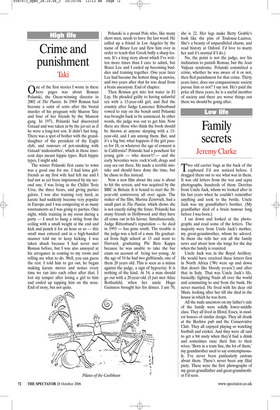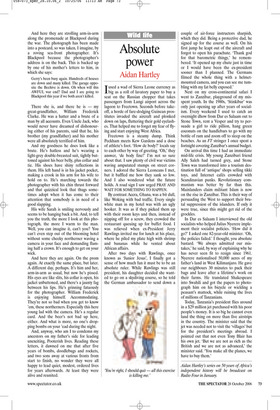Family secrets
Jeremy Clarke
Two old carrier bags at the back of the cupboard I’d not noticed before. I dragged them out to see what was in them. It was old letters from the war and sepia photographs, hundreds of them. Detritus from Uncle Jack, whom we looked after in his last years when he couldn’t remember anything and took to the bottle. Uncle Jack was my grandfather’s brother. (My grandfather died of a brain tumour long before I was born.) I sat down and looked at the photographs and read some of the letters. The majority were from Uncle Jack’s mother, my great-grandmother, whom he adored. In them she tells her son all the family news and about how she longs for the day when the family is reunited.
Uncle Jack was in the Royal Artillery. He would have received these letters first in North Africa (‘We were up and down that desert like bloody yo-yos’) and after that in Italy. That was Uncle Jack’s life, basically: fighting Nazis all over the world and commuting to and from the bank. He never married. He lived with his dear old Mum, looking after her till she died in the house in which he was born.
All the male ancestors on my father’s side of the family were solidly lower-middle class. They all lived in Ilford, Essex, in modest houses of similar design. They all drank at the Beehive pub and the Conservative Club. They all enjoyed playing or watching football and cricket. And they were all said to get a bit nasty when they’d had a drink and sometimes raise their fists to their wives. ‘Born in a tram line, the lot of them,’ my grandmother used to say contemptuously. I’ve never been particularly curious about them. There’s never been any filial piety. These were the first photographs of my great-grandfather and great-grandmother I’d seen. And here they are strolling arm-in-arm along the promenade at Blackpool during the war. The photograph has been made into a postcard, so was taken, I imagine, by a roving sea-front photographer. It’s Blackpool because the photographer’s address is on the back. This is backed up by one of his mother’s letters to him, in which she says:
Gerry’s been busy again. Hundreds of houses are down and many killed. The garage opposite the Beehive is down. Oh when will this AWFUL war end? Dad and I are going to Blackpool this year if we both aren’t killed.
There she is, and there he is — my great-grandfather, William Frederick Clarke. He was a hatter and a brute of a man by all accounts. Even Uncle Jack, who would never have dreamed of dishonouring either of his parents, said that he, his brother (my grandfather) and his mother were all absolutely terrified of him.
And my goodness he does look like a brute. He’s hatless and he’s wearing a light-grey double-breasted suit, tightly buttoned against his beer belly, plus collar and tie. His shoes have shiny reflections in them. His left hand is in his jacket pocket, making a crook in his arm for his wife to hold on to. He’s marching towards the photographer with his chin thrust forward and that quizzical look that thugs sometimes adopt when it has come to their attention that somebody is in need of a good slapping.
His wife Sarah is smiling nervously and seems to be hanging back a bit. And, to tell you the truth, the more I look at this photograph, the more I warm to the man. Well, you can imagine it, can’t you? You can’t even step out of the blooming hotel without some cheeky northerner waving a camera in your face and demanding flaming half a crown. It’s enough to get on your wick.
And here they are again. On the prom again. At exactly the same place, but later. A different day, perhaps. It’s him and her, arm-in-arm as usual, but now he’s pissed. His eyes are like slits, his collar is open, his jacket unbuttoned, and there’s a jaunty fag between his lips. He’s grinning fatuously for the photographer. William Frederick is enjoying himself. Accommodating. They’re not so bad when you get to know ’em, these northerners. Especially this here young lad with the camera. He’s a regular card. And the beer’s not bad up here, either. And what is more, no one’s dropping bombs on your ’ead during the night.
And, anyway, who am I to condemn my ancestors on my father’s side for leading unexciting, Pooterish lives. Reading these letters, it dawned on me that after five years of bombs, doodlebugs and rockets, and two sons away at various fronts from start to finish, no wonder they were all happy to lead quiet, modest, ordered lives for years afterwards. At least they were alive and reunited.



























































































 Previous page
Previous page